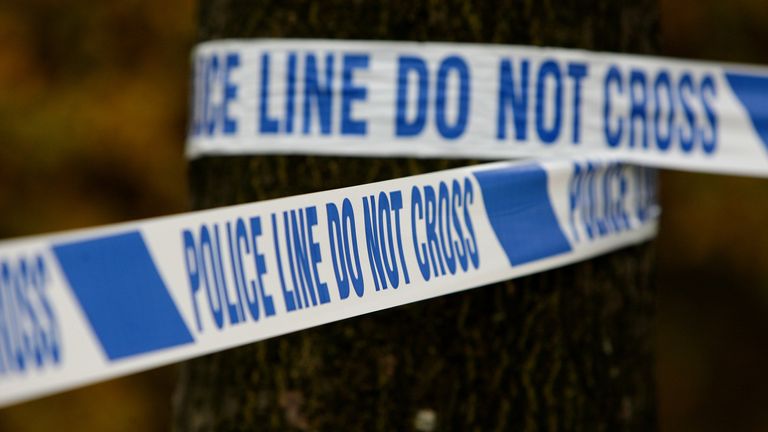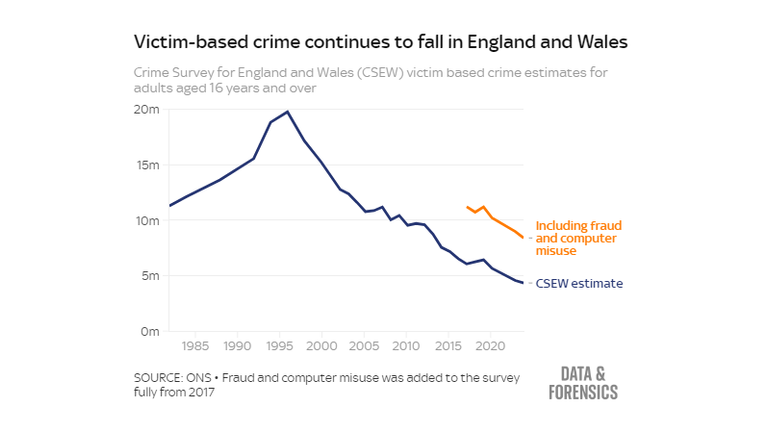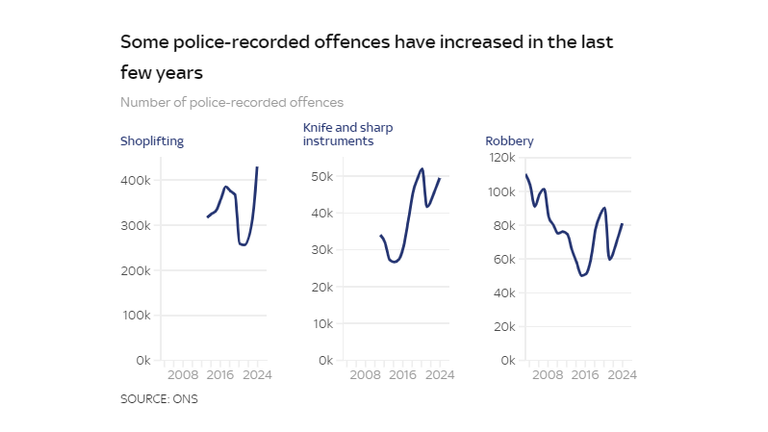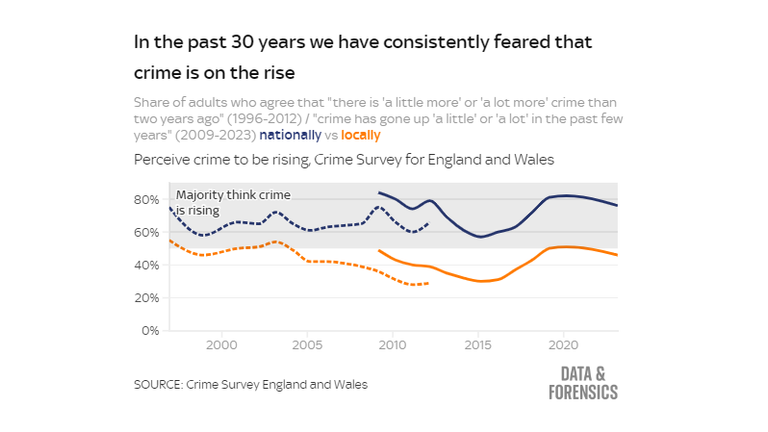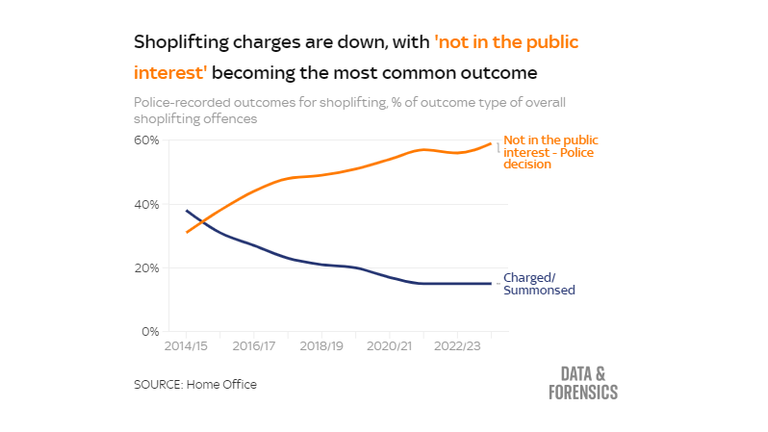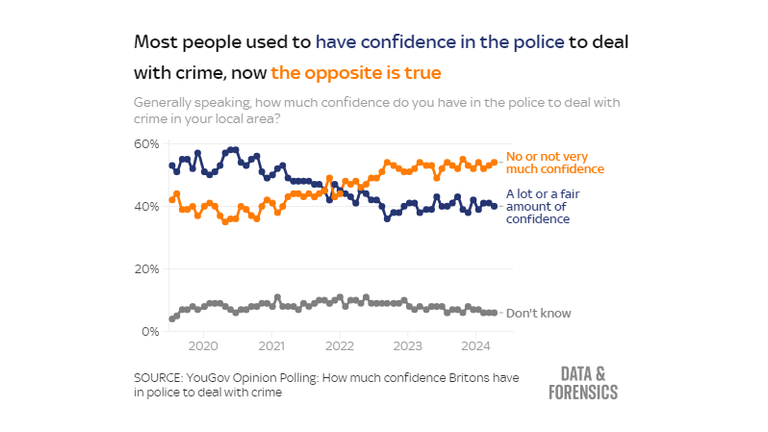Crime is down, but we still think it's a mean world - with some reason
Statistics show the perception of crime doesn't entirely reflect reality - but while we may be worrying too much, we're still right to be concerned.
Thursday 25 April 2024 18:57, UK
Here's a headline from the latest crime figures you may not see much in the media and perhaps weren't expecting: crime is at an all-time low.
But, according to the same release from the Office of National Statistics (ONS), 76% of people believe crime has gone up "a little" or "a lot" in the past few years at the national level.
So, most people are wrong about crime. But they're wrong in interesting ways - and right in some too.
That first graph is from the crime survey, which asks people about their experience of crime and is generally regarded as the best indicator - because many crimes do not get recorded.
However, it misses out on other crimes such as weapons possession and shoplifting, which are part of police-recorded crimes. Those are down too, very slightly (0.2%) but some crimes are actually rising.
Shoplifting is at the highest levels since current data began in 2003, and saw a huge increase of 37% compared with last year. Knife crime and robbery are also up compared with last year, although below pre-pandemic levels.
That may feed into people's perceptions. By definition, you cannot be a victim of shoplifting, because you are not a shop.
But you probably do go to a lot of shops - you may have noticed that many now keep their doors locked, making customers buzz in, or that butter may have a security tag, and your perception of crime may change as a result.
Or take knife crime and robbery. You are, thankfully, very unlikely to be a victim of either.
But videos showing those crimes are extremely easy to find on social media.
In 2020, the Crown Prosecution Service updated its advice to say that gangs are increasingly using "social media to promote gang culture, glamorise the gang lifestyle and the use of weapons".
That in turn may fuel crime itself. The director of Children and Families Services from Bristol Council this year said that "young people are telling us they are carrying knives as they are feeling unsafe in certain areas and communities".
They added: "This is mainly because of the negative online and media coverage, not necessarily first-hand experience."
So perceptions are important. And our perceptions have never really tracked with the actual level of crime.
More people now believe crime at the national level is worse than when it was at its 1995 peak - when it was much, much higher. And, over the years, a majority of people have consistently believed it's getting worse, even when it's been getting better.
But compare that to the perception of crime at the local level.
People who believe crime is getting worse are now in the minority. The perception of crime at a local level - when you ask people about their neighbourhood - is a lot more accurate and seems to track with the local crime rate.
Why the discrepancy? One theory, advanced by US academic George Gerbner, is "Mean World Syndrome".
This is the idea that because of mass media portrayals of violence, including TV news, we perceive the world to be much more dangerous than it actually is.
Mr Gerbner focused on television because that was the dominant media form when he coined the term in the 1970s, but others argue that social media has taken on the same function.
Because everyone now has a camera, violent instances are more likely to be recorded. And because video has become the dominant form on social media, especially on platforms such as TikTok and Instagram, they're more likely to spread far and wide. And there has been an increase in the perception of crime getting worse since 2016, even as TV's influence has waned.
So, if it's just a matter of perception and crime is at an all-time low, perhaps we should all learn to stop worrying about it?
No - we may be worrying slightly too much, but we're still right to worry.
Back to shoplifting. Thieves seem to operate with impunity - perhaps because they do. Fewer crimes are being investigated and prosecuted.
A change to the law in 2014 that shoplifting goods worth less than £200 is only a summary offence, may have prompted police to pay less attention to it. And it has been on the rise ever since.
So even as the crime rate is falling and so less crime is actually happening, because fewer crimes are prosecuted, people lose trust in the police.
Note that this is on the local level, where the public tends to be more accurate.
And note the cross-over - the point where people lose faith - is only as recent as 2022. Now, most people don't have confidence in the police to deal with crime in their local area.
That is a much more serious problem of perception. Because criminals will think the same - and carry on offending.
